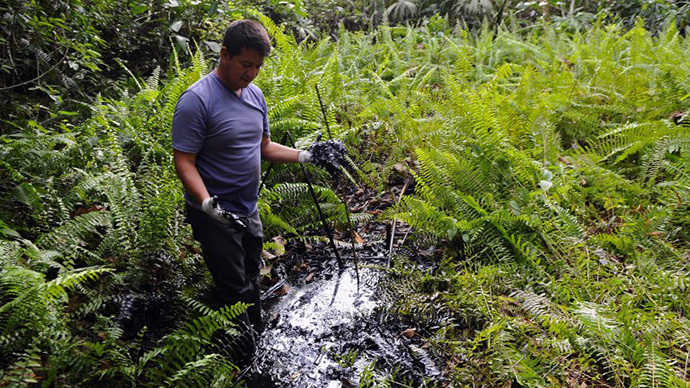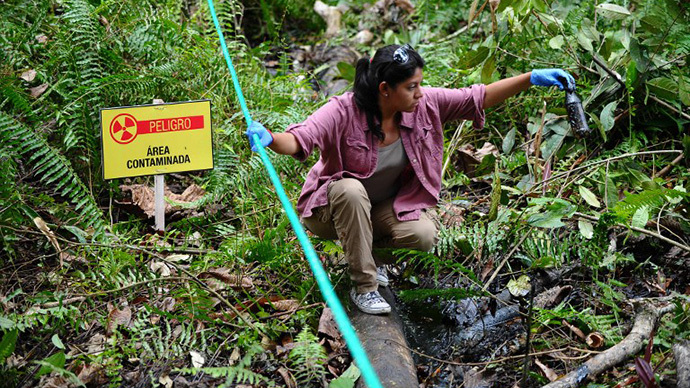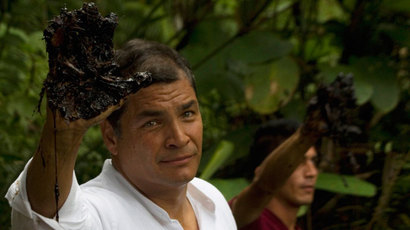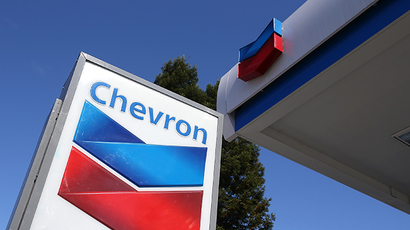Dirty dealings: Chevron’s toxic pollution fine reduced to $9.5bn

Chevron Corporation, the US oil giant, has been ordered to pay $9.51 billion by an Ecuadorian court for decades of damage caused by its sister company, Texaco, to the Amazon rainforest. The final verdict is nearly half the original $18 billion judgment.
Chevron refused to apologize for 40 years of harmful oil
extraction from the Amazon rainforest by Texaco, which has left
the land polluted with toxins and waste. Texaco was the first
energy company to drill for oil in the Amazon, and no longer
operates in the Republic of Ecuador.
The judgment "is as illegitimate and unenforceable today as it
was when it was issued two years ago," Chevron said.
Christopher Gowen, a spokesman for the plaintiffs, said Tuesday's
ruling was "reasonable, fair and a clear victory for
environmental justice."
The US’s second-largest US-based energy firm was originally
slapped with a $19 billion fine ($18million in damages, $1
million in processing fees). Ecuadorian judge, Nicolas Zambrano,
awarded residents of Lago Agrio $18 billion, to be paid by
Chevron in 2011, but the people there haven’t been able to
collect because Chevron no longer operates in Ecuador.
The Texaco Petroleum Company, which Chevron acquired in 2001, operated in the South American country from 1964-1990.
"Not only did they cause this pollution to save a few dollars,
but also they did not remedy it. They misled Ecuador and the
world, they misled the residents and the Ecuadorean state,"
Ecuador's president, Rafael Correa said after touring affected
Amazon towns in September.
The problems with the US oil companies even moved Correa to
cancel Ecuador’s investment protection treaty with the United
States.
The Hague’s Permanent Court of Arbitration decided Ecuador
lawfully released Chevron from pollution liability on September
18.

Before The Hague’s ruling, Ecuadorian Foreign Minister Ricardo
Patino Roca warned an unfavorable ruling against Ecuador could
force it into bankruptcy, as the $19 billion settlement is almost
20 percent of Ecuador’s GDP.
Chevron is currently in the process of suing Ecuador and their
lawyers for extortion in a US court.
They have accused Zambrano of ghost-writing the verdict in order
to extort money from the company, using fraudulent research
methods and bribes. The company believes it was actually written
by former Ecuadorian judge, Alberto Guerra and the plaintiffs.
Guerra testified on October 23 that he was paid to ghost-write
the ruling and that Zambrano’s favorable ruling was swayed by a
bribe of $500,000 from pollution plaintiffs.
Zambrano, who has since been dismissed from his job, told a New York court he worked alone and denies Chevron’s allegations. He added that the only assistance he had was from an 18-year old typist who helped with translations.
Chevron is also going after Manhattan lawyer, Steven Donzinger,
who represented Ecuadorian plaintiffs against the company.
On October 13, Chevron opened a case accusing Donzinger of
racketeering and using fraudulent means to win the $18 billion
pollution verdict against the oil company in Ecuador.
Last week Mr. Zambrano testified in a federal court in Manhattan
that he alone was the author of the judgment, although he was
unable to recall key portions of it.
Earlier in the trial, a Chevron witness - Alberto Guerra, another former Ecuadorean judge - testified that he was paid to ghost-write a number of Mr. Zambrano's rulings in the Ecuador case.
Mr. Donziger is expected to appear in court next week to present
his defense.
Before serving as Secretary of State from 2005-2009 under Bush,
Condoleezza Rice sat on Chevron's board.














